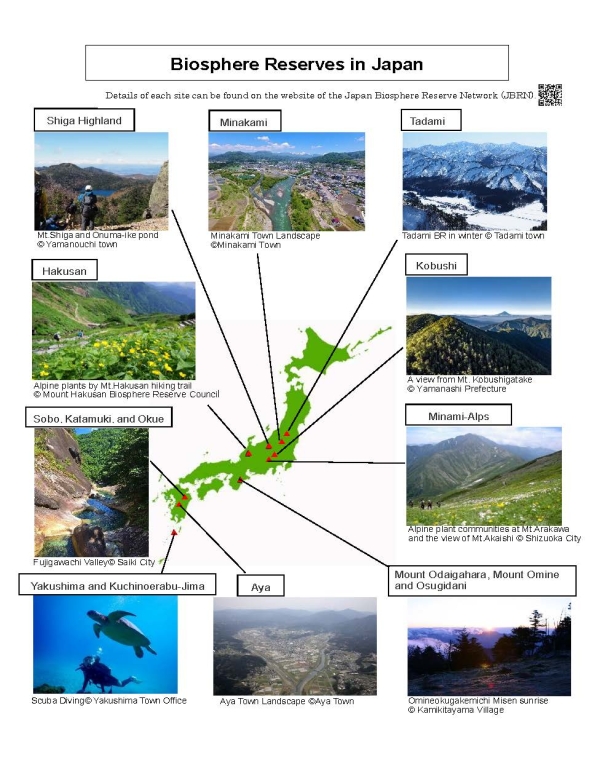The International Day for Biosphere Reserves(3rd November)
3rd November has been designated as the "International Day for Biosphere Reserves" in accordance with the decision of the 41st session of the General Conference of UNESCO.
The purpose of this international day is to promote the activities of Biosphere Reserves (BR) that aim to reconcile the conservation of ecosystems with their sustainable use (human society co-existing with nature) in a framework of Man and Biosphere (MAB) Programme.
We are pleased to inform you that three experts involved in the MAB programme in Japan have issued the statement for the International day for BR.
Please take this opportunity to look the role of BRs and initiatives of BRs in Japan to achieve a sustainable society.
A Message from the Experts
Message from Japan on the occasion of International Day for Biosphere Reserves
Miguel Clüsener-Godt, former Director, Division of Ecological and Earth Science, UNESCO
Tsunao Watanabe, Chair of Japanese National Committee for MAB
Hiroyuki Matsuda, Chair of the Japanese Coordinating Committee for MAB
The 3rd November is the “International Day for Biosphere Reserves (BR)”, which will be celebrated for the first time in 2022. The World Network of BRs (WNBR) was created in 1976 as the backbone for the conservation of biodiversity, restoration of ecosystems, and living in harmony with nature. Today, there are 738 properties in 134 countries, with 10 in Japan. The East Asian BR Network (EABRN) has 130 properties from 7 countries, including two trans-boundary BRs, and the Southeast Asian BR Network (SeaBRnet) has 88 properties from 11 countries, the latter of which is being supported by the Government of Japan. The WNBR is a unique tool for cooperation through knowledge sharing, exchange of experiences, capacity building, and promotion of good practices. Today, as the ecological carrying capacity of the planet is reaching its boundaries, we need to return to living in harmony with nature and to be inclusive in the SDGs for a sustainable society. To this end, it is imperative that we seek nature-based solutions (NbS), and that we maintain the integrity of water resource, climate condition, and terrestrial and marine ecosystems. From whatever vantage point we look at nature conservation, environmental, cultural, and religious point of view, it is our responsibility to respect nature. The SATOYAMA Initiative agreed upon at the 10th Meeting of the Conference of the Parties to the Convention on Biological Diversity (CBD/COP10), chaired by Japan, was a resolution to promote activities for "living in harmony with nature" in collaboration with the MAB program. BR fits the concept for "living in harmony with nature" that is promoted by CBD, and becomes more important today than ever before, where humans are thriving and relearning how to live with nature. In Japan, the Japan Biosphere Reserves Network (JBRN), consisting of all domestic BRs, was established in 2016 and has been operating independently as a collaborative organization. In 2017, a collaboration agreement was signed between the JBRN and the AEON Environmental Foundation, major stakeholder from private sector, to promote the activities of the BRs. Unique point of Japan is that municipalities play central roles in the management of BRs. Local governments are able to secure a certain amount of money from the local budget including government subsidies and grants every year, which provides a more stable financial base than in other countries where NPOs and charitable organizations are the managers. Another advantage of BRs in Japan is that they are easily accessible to local residents, such as by holding public lectures for residents hosted by local governments and by providing information and promoting participation in the activities of BRs through publications distributed to all households through town newsletters and other media. In Japan, almost all BRs work with UNESCO Associated Schools, and there are many examples of cooperation with universities and research institutions. In particular, UNESCO Associated Schools are promoting activities centered on ESD (Education for Sustainable Development), initiated by Japan, and their activities have a high affinity with BRs, which aim to achieve both ecosystem conservation and sustainable development. For example, Shiga Highland BR is actively using BR for ESD in cooperation with Shinshu University in the region. The UNESCO Chair on "Education for Sustainable Society Utilizing Biosphere Reserves", proposed by Yokohama National University, has been adopted, and the university is promoting the establishment of domestic and international networks using BR, MAB/SDGs education programs and overseas training programs based on project-based learning. This UNESCO Chair is also promoting the participation of young people in the MAB Program and in the BR management. Currently, BR is mentioned in the comprehensive strategies and basic plans of local governments in four BRs. The active inclusion of BR in comprehensive strategies, plans, and ordinances is important because it promotes understanding of the philosophy and the value of BR in the relevant regions. Following the Aichi Biodiversity Targets also adopted at CBD/COP10, an ambitious target of 30% of the area of protected areas and other effective area-based conservation measures (OECMs) in each country by 2030 has been proposed and support by many countries including Japan, and will be endorsed at CBD/COP15 in December this year. BR has core areas, which are counted as protected areas, outside of which there are buffer zones and transition areas that can be counted as protected areas or OECMs. In other words, BR could offer a way forward for both protected areas and OECMs for the 30by30 goal, and could propose effective cooperation between them. In Japan, the draft of the next National Biodiversity Strategy refers to BR that is linked to national parks and other protected area systems in Japan and OECM. BRs are all where science-based management plans are developed, local solutions for sustainable human livelihoods and nature conservation together are tested, and best practices are applied. These include biodiversity, clean energy, climate, environmental education, water, waste management, and other issues supported by scientific research and monitoring. It is important issue to create a resilient society to changes caused by natural disaster and pandemics. Through the above activities, BR will contribute to international initiatives such as the SDGs and 30by30 to achieve a sustainable society through nature-based solutions.

Message from Japan on the occasion of International Day for Biosphere Reserves (PDF:669KB)




